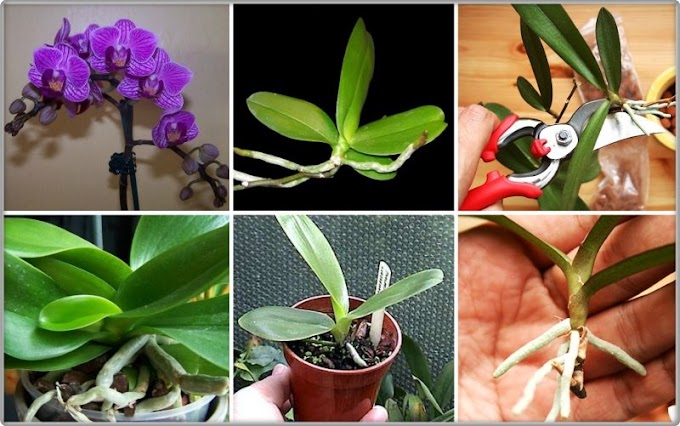Remember the thrill you felt as a child when you plunked a carrot top in a dish of water and watched leafy greens emerge from the top several days later? Growing houseplants in water is a twist on the same plant properties, all grown up.
Many houseplants are genetically programmed to form roots from plant pieces exposed to moisture. It's a survival and propagation adaptation; one that you can take advantage of to multiply your houseplant collection at no expense.
1:) African Violet
Growing an African violet in water from leaves is usually a good way to get a clone of the parent plant, although some multicolor violets will yield plants with solid color flowers. Choose young, healthy African violet leaves to start new plants. Cut the leaf with about two inches of stem, and place the leaf in a narrow-necked bottle that keeps the leaf suspended and dry. Roots take about a month to form. Over time a tiny plantlet will form, complete with its own crown.
2:) Baby's Tears
Baby's tears plants produce a myriad of tiny leaves on creeping plants that form a dense yet delicate trailing mat. Pinch off a cluster of stems, with or without roots, and watch how easily this plant adapts to growing in water. Because baby's tears plants grow so many leaves along their stems, leaves that are constantly submerged may begin to rot. Change the water weekly to remove any leaves that are floating in the water, and allow the water level to drop once roots are well-formed and delivering moisture to the plant.
3:) Begonia
The thick, succulent stems of begonias are very forgiving when harvesting the stems to grow in water. Practice with hardy wax begonias, which have very knobby leaf nodes that form roots easily. Even the fancy rex begonias and tuberous begonias will grow in water, and only a single leaf is necessary to start a whole new plant. It may take a couple of months for roots to form, and it's wise to perform weekly water changes to prevent bacteria that can lead to rot.
4:) Coleus
With so many new coleus varieties hitting the market each spring, it's easy to design an entire garden around the orange, purple, and chartreuse leaves of this tropical plant. As coleus plants have grown in popularity their prices have increased accordingly, but coleus plants are easy to propagate and grow in water, allowing you to create a colony of the handsome houseplants.
Take a six-inch cutting, and remove the leaves from the bottom four inches. Place the cutting in a glass or vase of water, and you will see roots begin to form in several weeks. Adding a bit of compost tea to the water during monthly changes will help your coleus plants thrive.
5:) Impatiens
Impatiens are a standby for shade gardens, but sometimes it can be difficult to keep them moist enough. In fact, impatiens can grow as marginal pond plants, that's how much they adore the water. Snip off a few stems at the end of the growing season, and overwinter them in a vase, where they will root and grow as clones of the parent plant. In the spring, you'll have a free supply of impatiens to start your shade garden.
6:) Lucky Bamboo
The hardy stalks of lucky bamboo can become a living centerpiece, no soil required. Growers often train the stalks of lucky bamboo into spirals or woven shapes, and while these extensions don't affect the plant's ability to grow in water, plants may become very top-heavy and require more than just water to stay in place. Surround your lucky bamboo stand with colorful gravel or rocks, which will add to the ornamental value as well as providing some support.
7:) Philodendron
Remember that trailing philodendron stem your mom had in the windowsill that seemed immortal? This ultra-easy houseplant is a no-fail introduction to growing plants in water.
An established philodendron won't mind donating several of its stems to water cultivation, and they look very pretty scattered about in vases of different sizes and colors. Philodendron plants grow in all light situations, but if it seems like there is more stem than leaf growth on your plants, a brighter light placement will enhance stocky growth.
8:) Wandering Jew
Wandering Jew plants fill a color gap in the houseplant collection like no other low-care plant can. Both the zebra-striped variety and the purple-leafed cultivar are well-adapted to houseplant life and will make a handsome focal point in rooms with moderate light.
If you've ever trimmed up a wandering Jew plant and noticed that a stray clipping looked lively a few weeks later, this is a clue to the ease with which you can grow these plants in water. Look closely at the leaf nodes along a wandering Jew stem, and you'll see root nubs waiting to grow. Add some stems to a mason jar or vase of water, and the plants will keep up their growth in your home.
source
8 Houseplants You Can Grow in Water
,
Random Post
https://succulents-garden.blogspot.com/search/label/DIY
Recent-Post
10/recent/post-list
Popular Posts
Recent Posts
8/recent/post-list
Created By SoraTemplates | Distributed By Blogger Templates




